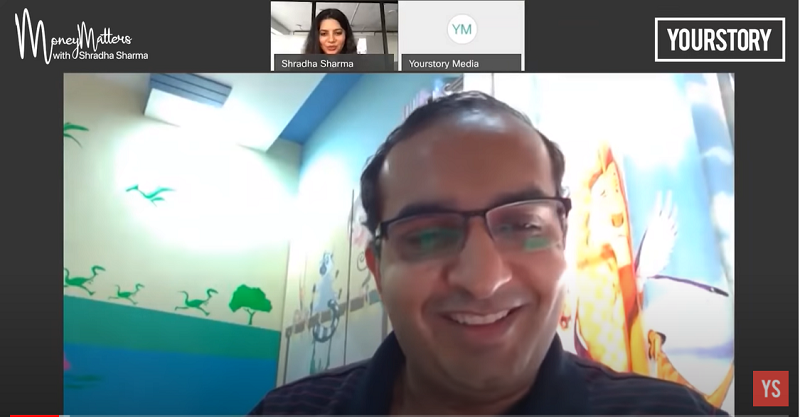With the coronavirus pandemic thwarting demand for insurance products as people tighten their purse strings, the non-life insurance industry has been sounding the bugle on a decline in new business underwriting and profitability.
But ICICI Lombard’s Chief Financial and Risk Officer, Gopal Balachandran thinks otherwise.
“Catastrophes instigate people to look for ways to protect themselves in the event that another one occurs. I think there will be a windfall of new businesses and people looking for insurance products once the pandemic ends.
“There’s no reason to believe that the non-life insurance sector will slow down. Things might be bad right now, but it’s just temporary. In fact, if anything, the pandemic will encourage people to get a basic health cover so they stay protected,” Gopal told YourStory Founder and CEO Shradha Sharma, during a chat in May.

Gopal Balachandran, Chief Financial and Risk Officer, ICICI Lombard
Non-life insurance penetration in 2020 - as a percentage of GDP - is only 0.97 percent in India, versus the global average of 2.8 percent. Even though they’re quite low, Gopal said these numbers don’t perturb him - instead, they represent the growth opportunity companies like his have in the non-life insurance space.
The outlook for India’s general insurance sector has never been brighter, even with the small pocket of slow growth due to the coronavirus pandemic, he said.
Despite being a more financially literate country compared to others in the region, India has been slow on the uptake of insurance products - be it auto, life, or even health. Whether it’s because of a lack of digitisation, being bogged down by endless paperwork, or the fact that ours is a more cash-intensive economy, insurance has always occupied the fringe of people’s thoughts when managing money.
That changed in the early 2000s when reforms in the insurance sector gave it a more formal structure, and the New Economic Policy opened up the industry to foreign players. New products, competitive insurance rates, broader coverage - all of these helped sell insurance to Indians, but penetration is still quite low.
There’s room to grow not just in the health space, but also auto and home. Of the 24 crore vehicles that ply on India’s roads, only half are insured, while less than one percent of the total population in India has home insurance. These are all opportunities general insurers can find something to be upbeat about, said Gopal.
Watch the full conversation here:
As of April 2020, private players in the non-life insurance space held a market share of 56 percent, according to data from the Insurance Regulatory and Development Authority of India (IRDAI). The industry is expected to hit Rs 4.43 billion by the end of FY 2023, from Rs 1.28 billion in FY 2017, a ResearchAndMarkets.com report said.
The government’s efforts to drive growth in the sector has been instrumental in not just deepening the insurance market but also spreading awareness about financial products, and the need for people to financially protect themselves. The Pradhan Mantri Suraksha Bima Yojana (PMSBY) recorded 154.7 million enrolments as of December 2019 since its inception, and the government has time and again stressed the need for citizens to have a holistic insurance policy.
Ensuring profitability
For ICICI Lombard, new businesses have contributed to driving profitability, but what has really helped the insurer has been its underwriting methods.
“The way we’ve written businesses has been a core reason for our profitable growth. It’s not just about writing new businesses, but equally about the obligations we have towards our stakeholders,” Gopal said.
Financial regulators around the world increased their oversight on insurers’ underwriting practices after the 2008 financial crisis, requiring financial institutions to set aside a fixed amount of capital to cushion any major blows, as well as disclose underwriting practices. For insurers, too, bad underwriting practices pose the risk of leading to defaults.
Gopal said that the trick is to strike the right balance between growth and profitability while being mindful of risk, adding that being agile and able to adapt quickly helps too.
“ICICI Lombard has been extremely nimble-footed in our ability to reorient the portfolio mix in terms of a profitable outcome. For that, you need to have an appropriate distribution reach, and, in the current context, you also need to create digital capabilities.”

ICICI Lombard's CFO, Gopal Balachandran, in conversation with YourStory's CEO, Shradha Sharma on an episode of Money Matters
Risk Management
Gopal said risk management for insurers depends on the tone those at the top of the value chain set for the company.
“Companies have to define their own risk appetites, and that comes from those higher up in the value chain in an organisation - they have to set the boundaries within which they want to operate, and it cannot be one size fits all solution. Every organisation has its own strategic objections, and risk appetite all depends on what objective is set,” he said. ICICI Lombard’s strategic objective is profitable growth, he added.
For companies in the process of defining their objectives, he recommended using only two or three metrics as benchmarks, and not to have pages-long goals.
“The objective could be qualitative or quantitative, but from personal experience, a quantitative, measurable appetite statement is better,” he said.
Once the organisation defines its risk appetite, the next step is to ensure that employees adhere to the guidelines and keep the culture intact. ICICI Lombard does this by training employees routinely and making it compulsory for them to take an examination on risk management.
Ensuring those practices are treated as sacrosanct can help the organisation take calculated risks even during uncertain times, said Gopal.
“As an organisation, we’ve tried to build a reasonably strong balance sheet in a way that will help us take risk capacities even in this uncertain time. We’re very well capitalised as an organisation,” he added.
(Edited by Ramarko Sengupta)
Want to make your startup journey smooth? YS Education brings a comprehensive Funding Course, where you also get a chance to pitch your business plan to top investors. Click here to know more.
Link : https://yourstory.com/2020/08/nonlife-insurance-india-icici-cfo-catastrophies-opportunities
Author :- Aparajita Saxena ( )
August 19, 2020 at 06:20AM
YourStory


